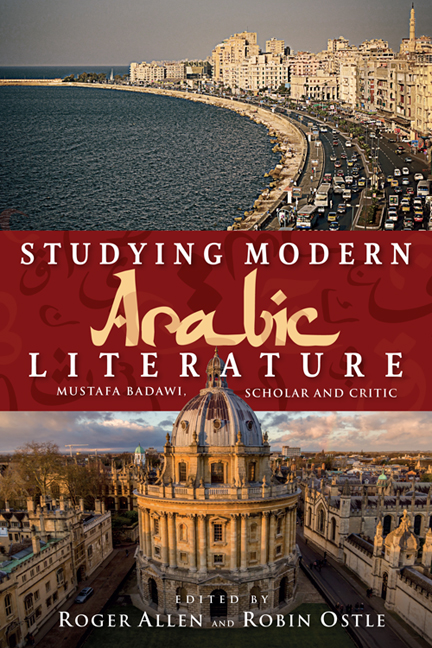Introduction
Published online by Cambridge University Press: 05 August 2016
Summary
It is no exaggeration to describe Mustafa Badawi as the father of the study of modern Arabic literature in the UK and the USA when one considers the impact of his career and his publications, followed by those of his energetic stable of doctoral students, most of whom are represented in this volume. His arrival in Oxford in 1964 as University Lecturer in modern Arabic literature was to transform the teaching of and research into this subject, which until that time had been treated as a marginal extension of classical Arabic and was very much taught as such. His lectures were a fresh and exciting invitation to consider Arabic as another literature of the modern world with a familiar range of genres and poetics fit to stand alongside and to interact with those areas of literary scholarship and criticism which had been long established in western universities. For the sake of Arabic, it was fortuitous that Badawi was trained in the University of Alexandria and in the UK in English literature: he published important work on Coleridge's Shakespearean criticism, and his engagement with Shakespearean studies remained constant throughout his career. When he was appointed to the Arabic post in Oxford, his passion for teaching, researching and translating English literature and criticism he simply applied to the modern literature of his native language, and thus began the transformation of its treatment in western academia. Badawi's arrival in Oxford also had a more subtle impact but one of far-reaching significance. The majority of academic posts in departments of Arabic and Middle Eastern Studies in the West have typically been devoted to history, the various branches of Islamic studies and the study of the Arabic language, while centres of area studies of the Near and Middle East have understandably concentrated on the modern history and the social sciences relating to the region. Badawi's post in Oxford was the first of its kind in that university. It has not always been easy to maintain and enhance the profile of the discipline of literature in these programmes.
- Type
- Chapter
- Information
- Studying Modern Arabic LiteratureMustafa Badawi, Scholar and Critic, pp. 1 - 4Publisher: Edinburgh University PressPrint publication year: 2015



